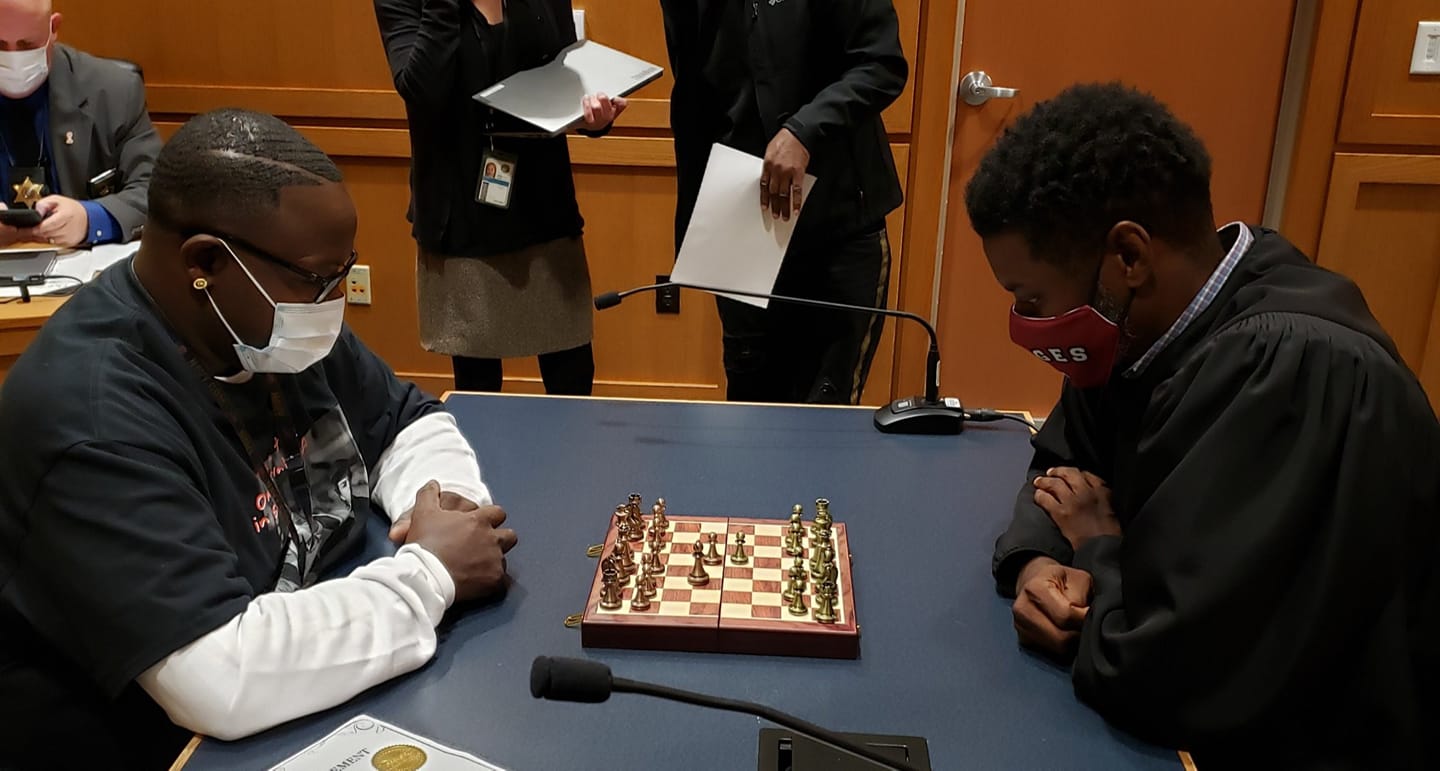
 Charles Green first saw a chessboard more than 40 years ago at Franklin Elementary School in Madison, Wisconsin.
Charles Green first saw a chessboard more than 40 years ago at Franklin Elementary School in Madison, Wisconsin.
“I saw two kids playing. I remember to this day, because I was a checker player, but I seen the chess and it intrigued me,” he says. “I was like, what the heck is this? And from that point on, I just wanted to learn how to play and I just fell in love with that game.”
Turns out, he had a knack for it. He joined the chess club and won a few tournaments, and today he calls himself the chess champion of his barbershop, where he plays almost every day.
“I’m the barbershop champion. I’m the people’s champion,” he says. “I mean, I win an awful lot. I don’t like to brag or nothing, but I’m pretty good.”
Green, 52, has also been involved in the criminal justice system in one way or another for a lot of his life, and played a lot of chess while incarcerated. About two years ago, he found himself in front of Judge Everett Mitchell in Dane County’s high-risk drug court, a program of the criminal justice system targeting people who have committed non-violent, drug-related crimes. People who complete the drug court program and stay sober can have their sentences reduced or even have charges dismissed.
Mitchell says he tries to approach people in his court as individuals, rather than numbers in a system. He says he doesn’t even use the word “defendant” in drug court, making a point to refer to people by their names.
“I try to find something that each person has a unique thing about, whether it is their art or their children, or chess, or reading books, or putting together puzzles,” Mitchell says. “You find something and you build on that strength, because you want them to know that they’re not invisible. And even though they’re adults, they’re still capable of change.”
For Green, that unique thing was chess.
“That was one of his passions,” Mitchell recalls. “And as he’s been working on his goals … I heard him talk about it briefly. And I said, ‘Well, let’s just think about us playing chess together. But, in order for me to do that, you have to maintain your goals for yourself and come in with some sobriety and then we will play.’”
“That made me feel wonderful,” Green says. “I was at a point in my life where I was having a hard time. And to be able to do that, do everything I have to do and get the judge to come sit down with me, I was on it.
“And I beat him, too,” he adds with a chuckle.
Mitchell didn’t mind taking the loss.
“It was just a beautiful thing for us to be together, two Black men playing chess together,” he says.
After the game, Mitchell posted a photo of the game on Facebook, and it was shared more than 200 times. “He won the game. I won his respect,” Mitchell wrote.
A change in mindset
Mitchell and Green both said the drug court represents a shift in the way the system approaches drug-related crimes.
“Rather than what happened in the 90s with the crack epidemic, we’ve really turned the corner to say this is not about punishment. It is recognizing that people have a sickness, and we just need to make sure that we’re responding to the sickness and not just treat them as straight criminals,” Mitchell says. “It has taken time to support people in that process of working through their sobriety and then reducing their criminal behavior at the same time. We see a correlation of the two.”
“I think people are getting smarter about this drug thing,” Green says. “I think they’re realizing that it’s not like a choice … it’s an epidemic.”
He adds that the “Just Say No” campaign launched by the Reagan administration wasn’t particularly realistic or helpful.
“If it was that easy, it wouldn’t be like this,” he says. “And I think programs like drug court really recognize that. And they’re doing something about that.”
Green says Mitchell represents that shift in mindset.
“It’s not strictly about drug court when you go to (Mitchell’s) court,” he says. “He’s just talking about what’s going on with you. And how your day’s going, how your life is going, what’s working for you, what you need to keep doing to keep it happening for you.”
Green has praise for the entire drug court team, as well, which includes caseworkers and counselors to support people and help them stay on track.
“Drug court is one of the best things that ever happened to me,” Green says. “I’ve been to treatment many times … and I’ve been to jail many times. In treatment, incarcerated. And … they all forced me. It was like, ‘do this or you go to jail.’ But in drug court, it’s like, they asked what they can do to help you. You make all your own choices. And say for instance, you slip up. I mean, if you’re a drug addict you’re probably going to slip eventually. You’re not going to jump and just become clean automatically. It’s going to be some slips, there’s going to be some bumps in the road and in drug court, they don’t put you in jail for that … They made me feel like they wanted to help me more than I wanted to help myself until, until I got to the point to, I want to help myself just as much.”
Green is now in a recovery program called 5 Door, and living in a sober house. He says he likes to help other people in the program out, giving them rides to appointments and meetings. He goes to play chess at the Vernee Nycole House of Beauty barbershop on South Park Street nearly every day. And he still attends drug court sessions once a week.
“Being around something like that’s what helped me get on track,” he says. “If it ain’t broke, don’t fix it, right?”



